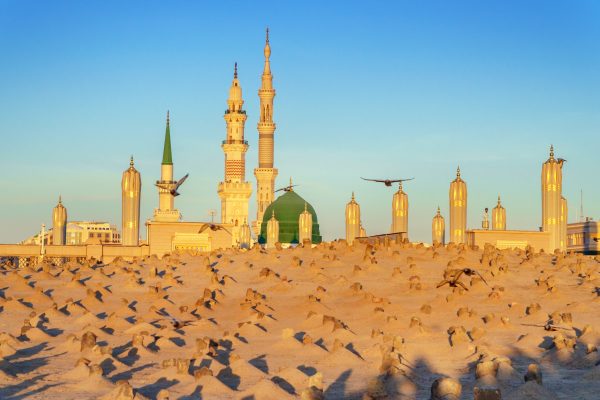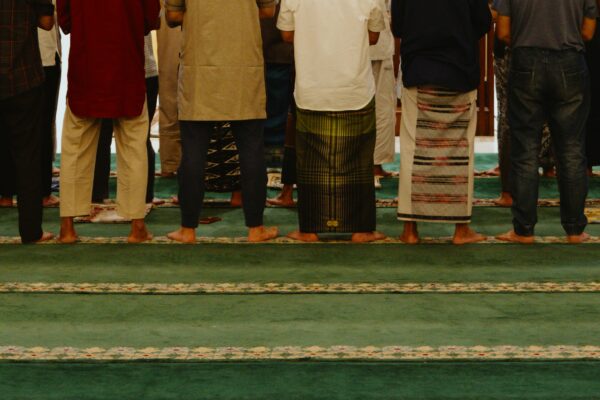2-3 million Uyghur Muslims held in concentration camps in China. More than 700,000 Rohingya refugees in Bangladesh. 71 years of Israeli occupation in Palestine. Hundreds of Nigerian Shia Muslims killed by government forces. 14 million at severe risk of starvation and death in Yemen. What can we do?
2-3 million Uyghur Muslims held in concentration camps in China. More than 700,000 Rohingya refugees in Bangladesh. 71 years of Israeli occupation in Palestine. Hundreds of Nigerian Shia Muslims killed by government forces. 14 million at severe risk of starvation and death in Yemen. What can we do?
In a world where much of the news seems negatively hopeless, it can sometimes feel daunting when it comes to human rights. How do we protect human rights, how do we support human rights, and how do we remain educated and informed on the different human rights abuses and violations that are happening around the world?
In Islam, we are constantly reminded in the Quran to stand with justice and in turn oppose injustice, no matter where it may come from. We therefore have a duty as Muslims to ensure we are protecting those most vulnerable, and to ensure we are upholding human rights in our societies and around the world.
…whoever kills a soul – it is as if he had slain mankind entirely. And whoever saves one – it is as if he had saved mankind entirely.”
[Quran 5:32]
Although there are numerous human rights issues around the world, and there should never be a comparison of evils, pain, or suffering, there are a few important issues around human rights that we should all be aware of. While this short list is in no way a complete list of human rights issues we should be educated and informed about, this is simply a small attempt at helping recognize and support our brothers and sisters who are suffering under human rights abuses:
Uyghur Muslims in China
The Uyghur Muslims are an ethnic minority within China, however have lived in the region now known as Xinjiang for thousands of years. Considered to be part of the wider ethnic-Turkic nomadic groups of Central Asia, Uyghur Muslims have been at the center of a targeted attempt at ethnic cleansing and genocide by the Chinese state.
With reports from human rights groups and experts on the region citing almost 3 million ethnic Muslims in the region being held in concentration camps across Xinjiang, these concentration camps are being called the largest mass incarceration of peoples since the Holocaust itself. China continuously detains, tortures, sexually abuses, sterilizes, rapes, and even kills Uyghur Muslims in these camps, with horrifying testimonials and evidence highlighting the brutal campaign of genocide being conducted in the region.
Female Muslim prisoners in China’s concentration camps are being gang-raped and tortured
Uyghur Muslims living across Xinjiang are also subject to severe state security measures, including forced fingerprint taking, forced home invasions and stays from official Han Chinese party members, and a ban on openly practising their faith – Uyghur Muslims can be detained for simply having a beard, praying in public, attending the mosque, learning Arabic, or fasting during Ramadan.
China claims that its current campaign of concentration camps and ethnic cleansing are all part of its policy of stopping dangerous foreign influences and terrorism. Recently leaked documents from local officials in Xinjiang as well as from the top leadership of President Xi Jinping highlight however that it is more about containing religious minorities – China is on a campaign of completely eradicating the Uyghur and ethnic Muslim populations of northwest China.
Leaked Chinese documents show full details of the genocide of Muslims in Xinjiang
Governments around the world have reacted slowly to this growing genocide in China – with many Muslim-lead states forming public friendships with China and praising Xi Jinping’s leadership and human rights record despite the massive evidence of concentration camps in Xinjiang. More important than ever, ordinary citizens like ourselves must step up to help raise awareness about the ethnic cleansing of Uyghur Muslims. Share the news, educate those who are unaware on the topic, and help inform community leaders to take a stance against Chinese aggression. Write to your congress men and women or local MPs and politicians, and demand those in power to take a position against China’s genocide against its ethnic Muslim population.
The Rohingya in Myanmar
The Rohingya Muslims in Myanmar have been under a concentrated attack by both governmental forces as well as extremist and armed Buddhist groups, who have burned down entire villages, conducted mass rapes, and killed indiscriminately. According to Human Rights Watch, around 700,000 Rohingya Muslims have fled their native state of Rakhine in Myanmar into neighboring Bangladesh, creating one of the worst humanitarian and refugee crises in the world today. The Myanmar military have been accused by the UN as having an intent to commit genocide on the Rohingya population.
Myanmar’s crimes against humanity on the Rohingya minority have caused an almost unprecedented crisis – denied citizenship in Myanmar, the Rohingya now constitute as one of the world’s largest group of stateless people. While more than 700,000 are now living in dire conditions across Cox’s Bazar in refugee camps in Bangladesh, even then many are faced with human rights violations.
In a recent report by Human Rights Watch, it has been revealed that Bangladesh is denying Rohingya children in refugee camps from having an adequate level of education, while banning them from attending school outside the camps. These children are not provided with a secondary-level education, and humanitarian aid groups in the camps are prohibited from establishing better schooling for the children.
Split between the dire situation of the refugee camps in Bangladesh and the horrifying ethnic cleansing that is happening in Myanmar, the Rohingya are in dire need of severe humanitarian aid and support. Myanmar’s leader Aung San Suu Kyi, who was previously awarded the Nobel Peace Prize, has been heavily criticized for her lack of response to the ongoing Rohingya crisis.
Myanmar formally accused of genocide over Rohingya crisis by The Gambia
While there has been a presence of humanitarian aid groups in the refugee camps across Bangladesh for the Rohingya Muslims, many are still suffering under inhumane conditions. We must step up both politically and socially – write to your local congress men and women or MPs and politicians, demanding they call out Myanmar’s horrific ethnic cleansing of the Rohingya population. Support charities and humanitarian aid work in Cox’s Bazar who are attempting to alleviate some of the horrifying issues faced by those Rohingya scarred by war. Many women have been victims of rape, sexual torture, and have witnessed the killings of their husbands, children, and family members. It remains imperative on our parts to help raise awareness on not only the plight of refugees in general, but especially of vulnerable women.
Palestine
The continued colonization and brutal occupation of Palestine by Israel is a humanitarian issue that has now had generational implications. Since Israel was declared an independent state in 1948, Palestinian lands have been occupied and the Palestinians living in them – Muslims, Christians, and Jews – have been brutally killed, violated, and have essentially been stripped of all human rights.
Now split into the West Bank and the Gaza Strip – more ominously known as the world’s largest open-air prison – Palestine is under a consistent siege of Israel’s illegal settlement buildings, indiscriminate killings, the detention of Palestinian minors and children, the bulldozing of homes, and the destruction of olive trees and lands. Israel continues to act with impunity as Palestinians suffer under one of the world’s longest cases of human rights abuses.
Israel has arrested 745 Palestinian children since the start of 2019
Backed by Western (and even some Middle Eastern) countries, Israel continues to bask in the support given to them by powerful governments around the world – despite being condemned by human rights groups, the UN on its illegal settlements, and international law. Many who support the BDS movement (the Boycott, Divestment, and Sanctions movements that attempts to restore Palestinian rights and statehood by boycotting all Israeli goods and products) have been blacklisted and attacked – a blatant example of Israel’s control over Western politicians, universities, and institutions.
As Palestinians continue to suffer under Israel’s brutal colonization, although there has been significant support from human rights groups and students, no real political or concrete solution has been given to an almost 71 year long conflict. Israel continues to take over what little is left of Palestinian land, while brutally murdering those arrested or demonstrating against Israel’s policies. Since only last year, at least 222 demonstrators have been killed in the Gaza Strip by Israel security forces – many of them minors or children who simply threw a stone or touched the fences separating the protesters and security forces.
Israel approves 2,300 homes for illegal settlers in the West Bank
As citizens of our countries, we should all work towards pressuring our politicians to recognize Palestinian statehood and oppose the Israeli occupation of the lands and people of Palestinians. Write to your MPs, local politicians, or congress men and women, and encourage your universities, religious institutions, or community groups to raise awareness about the plight of the Palestinians. As Palestinians continue to suffer under generational trauma and an almost-century long occupation of their lands by Israel, it remains more important than ever for us collectively to help support our brothers and sisters in Palestine.
The Shia minority in Nigeria
While often given little if no international media coverage, the Nigerian government has actively been at the center of a brutal crackdown on the country’s minority Shia Muslim population, killing hundreds and imprisoning Shia leader Sheikh Zakzaky in what many have tentatively called a genocide.
Beginning in 2015, the Nigerian government orchestrated the Zaria Massacre, which saw 347 Shia Nigerians killed during a procession in Kaduna state in northwestern Nigeria. Numerous human rights groups, including Human Rights Watch, have called for an immediate and independent inquiry into the massacre, which also saw dozens severely injured as well.
The wrongful imprisonment of Sheikh Zakzaky and the oppressive government of Nigeria
Sheikh Zakzaky is the leader of the Islamic Movement in Nigeria (IMN), a non-violent religious and political organization founded in the 1970s. Imprisoned for over a year alongside his wife by Nigerian authorities, many human rights groups as well as his supporters and family members have accused the government of severe human rights abuses and the torture of Sheikh Zakzaky. The Sheikh and his wife have reportedly been released since their initial arrest in 2015, although he and his supporters remain under heavy scrutiny from the state.
Although there are no stable statistics to the exact number of Shia Muslims in Nigeria, it is thought to be around 30% of the population, although this number is also contested. Sheikh Zakzaky’s IMN movement has contributed largely to the growing number of Shia Muslims within the country, although suffering greatly because of it from the Nigerian government. Constantly under attack from the government for allegedly being under foreign influence, according to Amnesty International around 400 members and supporters of IMN have been killed.
Human Rights Watch calls for Nigerian to end repression against IMN
Irregardless of whatever sect or religion you may come from, it is our duty to stand with those who are being oppressed unjustly, as it remains imperative on our end to bring awareness to this little-reported atrocity happening in Nigeria. As the Shia Muslims continue to be persecuted in Nigeria, little or no international attention or support has been given to those most desperately in need of humanitarian protection. We must be diligent in raising awareness in our community and religious centers, as well as with our local politicians in bringing to light such a worrying example of religious persecution.
The Yemen crisis
The war in Yemen and the ensuing crisis has been called by human rights groups as one of the largest humanitarian disasters in the world. Yemen’s now four year long war had led to 100,000 people killed, with 12,000 of those deaths being innocent civilians. According to Save the Children, 37 Yemeni children die per month due to the continued fighting and outbreak of diseases and starvation.
Beginning in 2015, Saudi Arabia and its allies orchestrated a massive attack against the Houthi rebels of Yemen, who were fighting against the then-President Hadi, backed by Saudi Arabia, as part of the larger so-called Arab Spring. Since then, Saudi Arabia has continued to lead a coalition against Yemen, fighting both the Houthis and Yemeni civilians indiscriminately. 14 million Yemenis are now at severe risk of starvation and death. Set to become the poorest country in the world according to the UN, Yemen is at the center of a massive humanitarian crisis.
The outbreak of diseases such as dengue fever, cholera, and malaria have also claimed the lives of thousands, with more than 56,000 cases of just cholera reported in Yemen in past year alone. With an almost complete lack of healthcare services, access to clean facilities, and lack of basic food, water, and shelter, civilians continue to suffer. Yemeni children are also at the center of the humanitarian crisis, with 92% of Yemeni children being born already underweight.
While human rights groups and humanitarian charities are attempting to help those in Yemen, the Saudi-led coalition is continuing its indiscriminate bombing and killings in Yemen, making aid work almost impossible. Western governments also continue to supply Saudi with arms sales, therefore aiding the destruction and desolation of Yemen.
Saudi Arabia directly responsible for two-thirds of civilian deaths in Yemen
As Muslims, and as human beings part of a larger global community of those intent on supporting human rights, we must help raise awareness about the crisis in Yemen and demand our governments to stop aiding the war in Yemen. As civilians suffer the brunt of the war, innocents continue to be killed and displaced – and as one of the world’s worst humanitarian crises goes into its fifth year, it remains imperative on our parts to demand our governments help end this brutal war.
While this is but a sample of the human rights issues around the world that are happening, we must remain informed, vigilant, and passionate about protecting the rights of all human beings. If you feel passionately about a human rights issue that wasn’t covered in this article, get in touch with us at The Muslim Vibe to share your thoughts and opinions.





